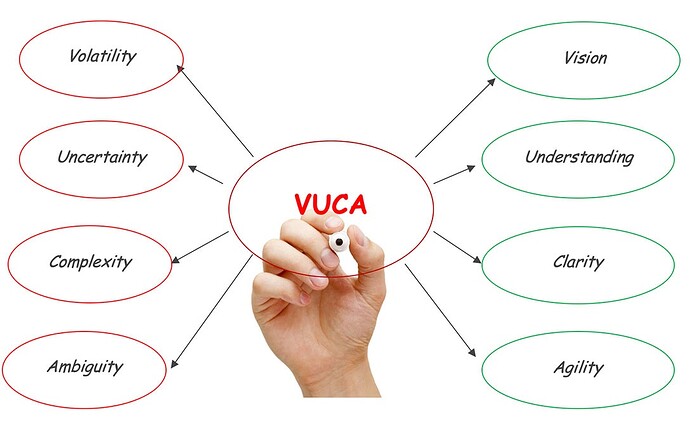Yes, I guess sociocracy can offer better approaches for dealing with VUCA issues.
VUCA stands for Volatility, Uncertainty, Complexity, and Ambiguity, and it describes the challenging and rapidly changing environment that many organizations and communities face today.
Here’s how sociocracy can be beneficial in managing VUCA challenges:
- Adaptive Decision-Making:
Sociocracy’s continuous improvement approach and regular review cycles allow organizations to adapt quickly to changing circumstances and make informed decisions based on real-time feedback and data. This helps organizations respond effectively to the volatility and uncertainty of VUCA situations.
- Collaborative Problem-Solving:
Sociocracy emphasizes open communication, collective intelligence, and inclusive decision-making. When facing complex and ambiguous situations, drawing on diverse perspectives and expertise can lead to more creative and effective solutions.
- Clear Roles and Responsibilities:
Sociocracy’s clear role definitions and domain boundaries help reduce ambiguity in decision-making by specifying who is responsible for what. This clarity can be particularly valuable in navigating the complexity of VUCA environments.
- Effective Communication:
Sociocracy’s structured meeting processes and mechanisms for addressing tensions promote efficient and transparent communication. This can help organizations manage ambiguity by ensuring that information flows effectively and issues are addressed in a timely manner.
- Distributed Authority:
Sociocracy’s circle structure and decentralized decision-making empower individuals and teams to make decisions at appropriate levels. This enables organizations to respond quickly and effectively to VUCA challenges without waiting for approval from higher levels.
- Resilient Structures:
Sociocracy’s focus on circles and double-linking promotes redundancy and adaptability in organizational structures. This redundancy can enhance resilience in the face of unexpected disruptions or changes.
- Consent Decision-Making:
Sociocracy’s consent-based decision-making process allows for quicker decisions while still ensuring that concerns and objections are addressed. This balance between speed and inclusivity is important in uncertain and fast-changing environments.
- Engagement and Ownership:
Sociocracy encourages active participation and shared ownership among members. This sense of ownership can boost morale and motivation, making it more likely that individuals will contribute their best efforts to address VUCA challenges.
- Learning and Flexibility:
Sociocracy’s focus on continuous improvement and learning aligns with the need to adapt and experiment in VUCA environments. Organizations can use feedback loops to learn from their experiences and adjust strategies accordingly.
- Conflict Resolution:
Sociocracy provides a structured approach to addressing tensions and conflicts. This helps organizations manage the potential conflicts and ambiguities that can arise in VUCA situations in a constructive and collaborative manner.
VUCA situations may require a combination of approaches, including leadership agility, strategic foresight, and external partnerships.
If you want to share your personal reflections on this topic, please feel free to do so in a comment below. Thank you.
Best wishes!
Related posts:
